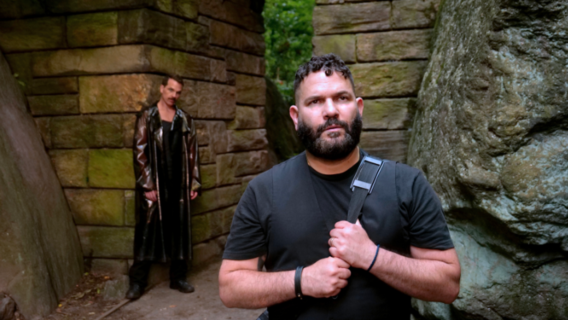Products You May Like

For decades, William Friedkin’s Cruising was the only film that attempted to tackle the act of cruising, or searching for casual sex in a public location. Directed by and starring straight cis men, Cruising sensationalized the queer community and made common behavior a spectacle to be ogled at by scandalized straight audiences. Now, queer cinematic trailblazer Todd Verow is taking back the cruising thriller with his latest film You Can’t Stay Here. Through an explicitly gay lens, Verow delves into a big part of gay culture while also examining bad queer characters, the power of internalized homophobia, and the thrilling danger inherent to gay sex.
Shot like a seedy straight-to-video film from the ’90s, Guillermo Diaz stars in You Can’t Stay Here as aspiring photographer Rick who walks a common cruising spot in Central Park, taking photos of clandestine hookups while also looking for sexual partners of his own. He’s grappling with his sexuality, his recent divorce, his career, his role as a father, and his aging mother who needs constant care. Cruising is his escape, not only an artistic outlet but one where he can express his sexual desires with anonymity. No one knows him and he can truly be himself.
Also Read: ‘She Is Conann’ Review: A Glorious Glitter-Filled Gaze Into Violence and Identity
But, during one of his visits, he captures photos of a serial killer attempting to claim the life of another victim. Armed with a leather trench coat, a knife, and a mysterious concoction disguised as poppers (a popular club drug in the gay community), this killer is targeting gay man in the park, acting like a willing sexual partner, only to knock his victims unconscious with his special brand of poppers. It’s akin to being roofied as victims are rendered helpless against their assailant. And Rick just happens to capture all of this on camera.
Quickly, Rick and this killer enter a sensual game of cat and mouse as Rick worries the man is following him and trying to take over his life. He descends into a state of paranoia, questioning everyone around him, and is no longer able to trust his own perception of reality. You Can’t Stay Here takes giallo, slashers, and erotic thriller tropes and reframes them within an inherently queer context to create a fascinating low-budget psychosexual thriller. Plus there is a lot of gay sex.
Also Read: ‘Departing Seniors’ Review: A Queer Teen Slasher Full Of Heart
Importantly, that sex is framed as normal, important, and beautiful, not a spectacle but still a little dangerous. Verow walks a tightrope in showing the thrill of public sex while not making it a spectacle that points the finger at gay men and their lewd behavior. Instead, Verow creates an inherently queer world that doesn’t shy away from the dangers of gay sex without making it feel like something dirty or wrong. Such is Verow’s specialty, directing films such as Frisk, which follows a gay serial killer. Verow isn’t interested in clearcut narratives about the gay experience. Instead, he wants to tackle complicated, chaotic queer characters that are allowed to be bad, messy, weird, and even downright evil. Verow has always pushed the boundaries of queer representation on screen, and he continues that trend with You Can’t Stay Here.
To get us into the mind of his complicated characters, Verow employs handheld aesthetics to make this film feel more like a documentary about a struggling gay man than a crime thriller. As the camera stays on Diaz’s face and never leaves it, we can’t help but become deeply engrained in the chaotic maelstrom of Rick’s mental state. We question his motives and realize that we’ve been coupled with an unreliable narrator trying his best to swim through a quagmire of traumas and blossoming desires. The camera truly becomes a character, a voyeur of sorts staring down gay men having sex, making us as the viewers all the more aware of our role as participants.
Also Read: ‘Here for Blood’ Review: Campy, Brutal, and F**king Awesome
Paired with Verow’s camerawork is an incredible performance by Diaz as a seedy cameraman straight out of an Argento film. He’s both shy and confident, a bit new to his new open identity but still timid to approach any potential partners. He is both empathetic and pathetic, a slew of things that make him fascinating to watch onscreen as he descends into madness. It’s refreshing to see Diaz in such a film, expanding from more sanitized studio roles into more experimental and explicitly gay performances.
Ultimately, the latest film from Verow is queer guerilla filmmaking at its finest. It’s punk, it’s gritty, and at times it feels dangerous to even watch. While the low-budget aspects shine through at moments, it doesn’t take away from the impact that You Can’t Stay Here is meant to have. Cruising is a reality of queer sex and it shouldn’t be demonized as some act of perversion. Verow reclaims assumptions about the gay community at a crucial time. This is queer horror history and necessary viewing for those who beg for more representation in the genre.
Categorized: Reviews
